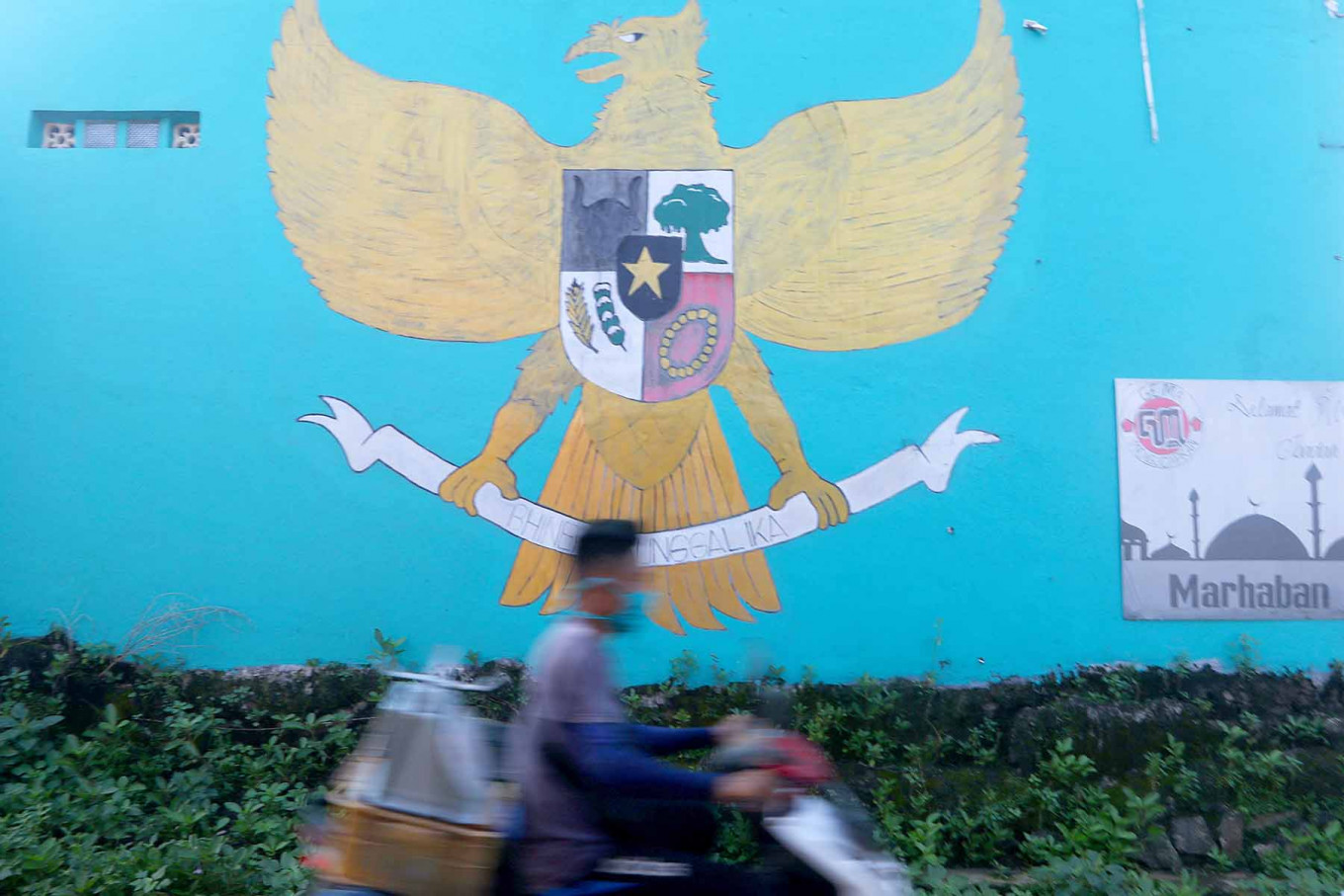Popular Reads
Top Results
Can't find what you're looking for?
View all search resultsPopular Reads
Top Results
Can't find what you're looking for?
View all search resultsThe political (re)constructions of Sukarno and Pancasila
The brouhaha over Sukarno’s legacy, including that of Pancasila, is a clear indication of our immaturity as a nation — certainly that of our lawmakers.
Change text size
Gift Premium Articles
to Anyone
T
o construct and reconstruct is a basic human activity. We build physical things, they deteriorate and get destroyed, so we reconstruct and build them up again.
But when we talk about social constructs, they exist in people’s minds to interpret the world. In no field is this so true as in history and politics with regard to both events and figures where interpretations can be distorted and manipulated, and you can even kill someone more than once. This happened to Sukarno, Indonesia’s first president who served from 1945 to 1966.
His obituary in The New York Times in 1970 by Alfred Friendly Jr., noted that “he gave the 110 million inhabitants of Indonesia's 3,000 islands a common language, a sense of shared identity and a vision of exuberant destiny”.
Indeed Bung (brother) Karno as he liked to be called, achieved the incredible feat of leading Indonesia’s independence from Dutch colonialism. He spent a decade under Dutch detention.
Sukarno and Mohammad Hatta, his would-be vice president, declared Indonesia’s independence on Aug. 17, 1945. In June 1 of that same year, Sukarno formulated the five pillars of the state ideology Pancasila, which remains until now a blueprint for the Indonesian nation, its constitution and laws.
On July 18, 2020, a statue of Sukarno was erected in Algiers to celebrate Indonesia’s historical connection with Algeria and Indonesia. Algeria had attended the Asia Africa conference in Bandung in 1955, which inspired its struggle for independence from France in 1962.
The statue was unveiled virtually in Algiers by Puan Maharani, Sukarno’s granddaughter from Megawati Soekarnoputri, Indonesia’s fifth president (2001-2005).
The statue itself was designed and made by Dolorosa Sinaga, renown sculptor, human rights and feminist activist, commissioned by Ridwan Kamil, governor of West Java. Kamil, a former architect, also designed the plaza monument where the statue stands (see “Sukarno monument to grace Algiers’ city center” published in The Jakarta Post on June 23).
Algeria is the second country that has erected a statue of Sukarno outside of Indonesia. The first was in Mexico in Sukarno Parque, unveiled on Sept. 26, 2019. He has been recognized in other ways, as the name of a street, building and even a tree in Mount Arafat, Saudia Arabia.
This affirms his iconic and enduring status in the world and the continued respect and recognition of Sukarno.
What about in Indonesia? As the founder of the Indonesian nation state, he must have unquestioned hero status, right? Unfortunately, it’s not that straightforward.
Despite the struggles and sacrifices he made, and as Friendly wrote, being recognized as a giant among Asian nationalists after World War II, Sukarno ended his life in relative obscurity. After the alleged Communist coup in 1965, “the right‐wing military leaders consolidated their power and dethroned Mr. Sukarno”.
From the start of the Soeharto New Order military dictatorship (1966-1998), there have been various attempts at de-Sukarnoization. In 1967, the People’s Provisional Consultative Assembly (MPRS) stripped him off his powers and put him under house arrest. During that time, he was denied health care, which led to his death from kidney and heart problems, as well as the isolation and mental torture he was made to suffer. So, this was the first time Sukarno’s was killed. The way he was treated by the then-military government was effectively slow murder.
Soeharto also denied Sukarno’s request to be buried at the Bogor Palace in West Java over fears that Bogor could be a focal point for opposition to Soeharto’s rule. Instead, he was buried in Blitar, his birthplace in East Java, about 750 kilometers away from Jakarta.
Monuments and places named after Sukarno were changed: the Gelora Bung Karno Sports Complex in Central Jakarta became the Senayan Sports Complex, Sukarnapura (Sukarno City) in Papua was renamed Jayapura and Puncak Sukarno (Sukarno Peak, also in Papua) became Puncak Jaya. If this was not a killing, it was certainly an erasing.
In 1981, he experienced this deletion again, this time more in relation to his political-ideological legacy: Pancasila. Nugroho Notosusanto, the New Order military right-wing historian, claimed that it was Mohammad Yamin, another politician, lawyer, poet, national independence leader, who was the founder of Pancasila and that Sukarno merely used the term. Nugroho also said that June 1 can’t be considered the birth of Pancasila. Instead, the version of Pancasila that became the official state ideology was formulated on Aug. 18, 1945, by the Indonesian Independence Preparatory Committee (PPKI).
So, you get the picture? This “reconstruction” of history became the official version of history taught in schools.
It is now 22 years since the so-called end of the New Order, but the attempts to further reformulate Pancasila are still going on in the form of the a controversial bill on Pancasila (RUU HIP), which aims to reduce the five principles into three and even one. Who knows what the motive is behind this bill, but luckily, deliberations have been postponed.
Only postponed? Why not scrap it altogether?
The brouhaha over Sukarno’s legacy, including that of Pancasila, is a clear indication of our immaturity as a nation — certainly that of our lawmakers. What with the coronavirus pandemic still going on unabated with its long term effects such as poverty, decline in education and the health system, and the rise in domestic and sexual violence, don’t our House of Representatives members have a better sense of priority of the nation’s and people’s needs?
***
The writer is the author of Julia’s Jihad










